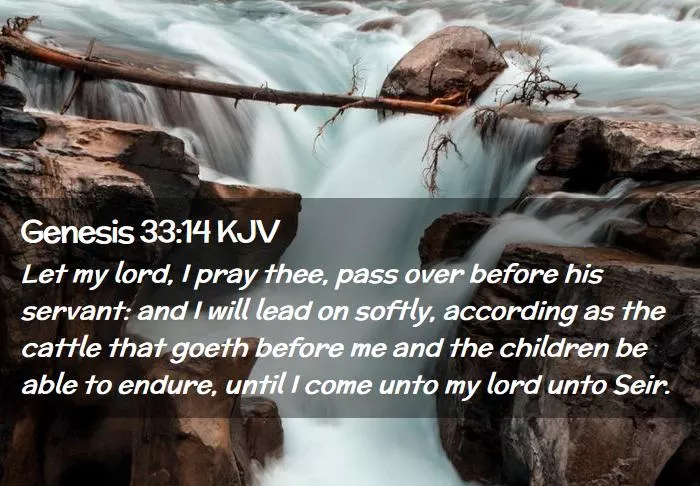Read the Daily Bible Verse – Genesis 33:14 To Strengthen Your Spiritual Journey.
Genesis 33:14 is part of a pivotal narrative in the life of Jacob, a key figure in the Hebrew Bible. To fully grasp the meaning of this verse, it’s essential to understand the broader context surrounding it. The book of Genesis outlines the origins of the world, the patriarchs, and the formation of Israel, culminating in a rich tapestry of stories filled with conflict, reconciliation, and divine intervention.
Jacob’s Journey
Jacob, the son of Isaac and Rebekah, is known for his complex character and life experiences. He had previously deceived his brother Esau to receive the blessing meant for the firstborn, leading to a deep familial rift. After fleeing to Haran to escape Esau’s wrath, Jacob spent twenty years away from home, marrying Leah and Rachel and accumulating wealth.
The Reunion with Esau
Upon returning to Canaan, Jacob feared meeting Esau again. His apprehension was understandable given their tumultuous past. In preparation, Jacob divided his family and possessions into two camps, hoping that if Esau attacked one group, the other might escape. However, prior to their meeting, Jacob wrestled with a mysterious figure—an encounter that transformed him and marked a new phase in his life.
The Verse in Context
Genesis 33:14 reads:
“I will lead on softly, according as the cattle that goeth before me and the children be able to endure, until I come unto my lord unto Seir.” (KJV)
This verse occurs after Jacob and Esau reconcile, highlighting Jacob’s thoughtful approach to leading his family and livestock. His choice of words reflects his desire to prioritize the well-being of his family, particularly the children, as they travel together.
The Genesis 33:14 Meaning
Genesis 33:14 serves as a pivotal statement about leadership, responsibility, and reconciliation. It underscores the themes of patience, wisdom, and the consideration of others’ needs.
Leadership and Responsibility
Jacob’s decision to lead “softly” reveals a nuanced understanding of leadership. Unlike a conqueror or a hasty leader, Jacob exhibits a compassionate approach, taking into account the limitations of his family and animals. This is an important aspect of biblical leadership; it requires understanding and meeting the needs of those being led.
Reconciliation and Healing
The context of reconciliation between Jacob and Esau is also crucial. Their embrace after years of estrangement signifies a restored relationship, which is further emphasized by Jacob’s considerate demeanor. This moment illustrates that reconciliation often requires humility and a willingness to adapt to the needs of others.
Genesis 33:14 Application in Life
The principles found in Genesis 33:14 extend beyond its historical context, offering valuable lessons for modern life.
Prioritizing Others
In a world often driven by self-interest, Jacob’s approach encourages us to prioritize the well-being of others. Whether in our families, workplaces, or communities, showing patience and understanding can foster stronger relationships and promote unity.
Leading with Compassion
Leadership today can often be transactional or authoritative. However, the call to lead with compassion, as Jacob did, is timeless. This principle applies to various contexts, including parenting, management, and community leadership. Taking the time to understand the struggles and limitations of others can lead to more effective and harmonious relationships.
Embracing Change
Jacob’s journey from deception to reconciliation exemplifies the importance of personal growth and transformation. Embracing change can lead to healthier relationships and renewed perspectives on past conflicts.
Comparison with Other Biblical Texts
The Principle of Gentle Leadership
Genesis 33:14 can be compared to other biblical texts that emphasize gentle leadership. For example, in 1 Peter 5:2-3, church leaders are encouraged to shepherd with humility and not to lord over others. This aligns with Jacob’s approach of leading softly, taking into consideration the vulnerabilities of his family.
Reconciliation Themes in Scripture
The theme of reconciliation is also prominent in the New Testament. In Matthew 5:23-24, Jesus teaches that if someone remembers their brother has something against them, they should first reconcile before offering gifts at the altar. This echoes the spirit of Genesis 33:14, where reconciliation comes before leadership and communal responsibilities.
The Call to Patience
James 1:19 offers guidance on being “quick to hear, slow to speak, and slow to anger.” Jacob’s decision to lead softly aligns with this call for patience and understanding, emphasizing the value of listening and considering the needs of others.
Modern-Day Relevance
Navigating Relationships
In contemporary society, the principles illustrated in Genesis 33:14 are profoundly relevant. Whether in family dynamics, workplace environments, or community interactions, the need for compassionate leadership and thoughtful engagement is critical.
Conflict Resolution
As conflicts arise in various aspects of life, the emphasis on reconciliation found in this verse can guide individuals in navigating disputes. Approaching conflict with a mindset of understanding and patience can lead to more fruitful outcomes.
Mental Health and Well-Being
In an era where mental health awareness is rising, the concept of leading softly resonates strongly. Recognizing the emotional and psychological limitations of ourselves and others encourages a more supportive and nurturing environment, whether in familial or professional settings.
Conclusion
Genesis 33:14 encapsulates essential truths about leadership, reconciliation, and the value of prioritizing others’ needs. Jacob’s thoughtful approach offers timeless lessons applicable in various aspects of life, urging us to embrace compassion and patience in our interactions. By reflecting on these principles, we can foster healthier relationships and create environments rooted in understanding and cooperation.
Genesis 33:14 Commentary
In summary, Genesis 33:14 is not merely a historical account but a profound lesson in humanity. It highlights Jacob’s transformation and offers a blueprint for how we might lead in our own lives—by putting others first, embracing change, and committing to reconciliation. As we navigate our relationships today, let us carry forward the lessons from this poignant moment in scripture, striving to lead with gentleness and understanding in a world that often demands otherwise.
Related topics:
- What does Genesis 33:13 Mean?
- Genesis 33:12 Meaning, Context & Commentary
- What does Genesis 33:11 Mean?

